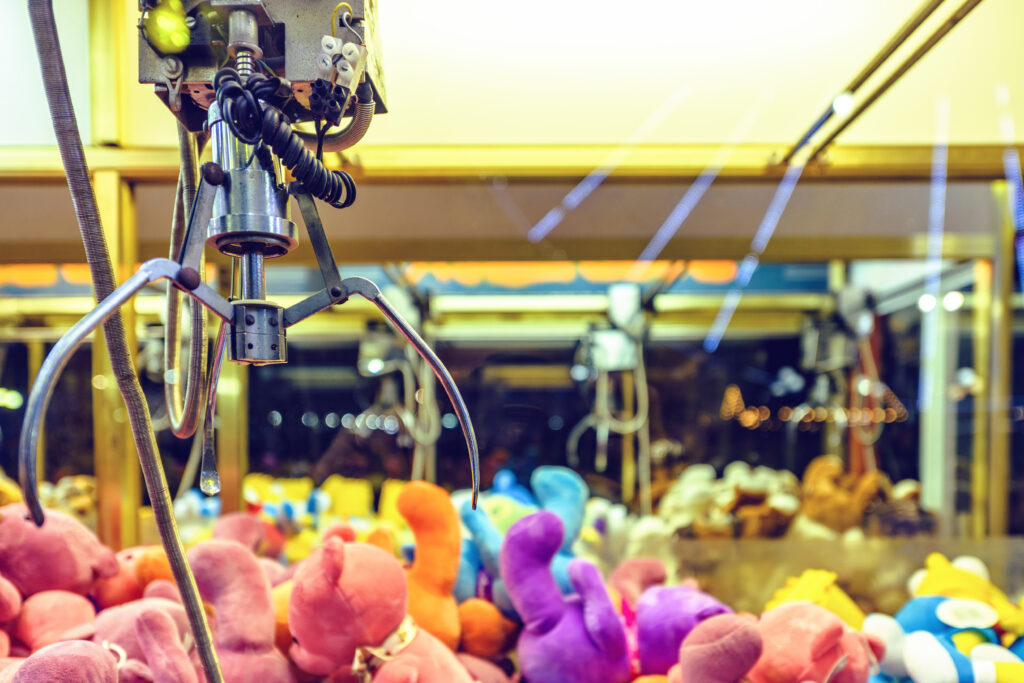Crane Games
From Childhood Fun to Business Success

by Howard McAuliffe, Partner, Pinnacle Entertainment Group
Cranes and merchandisers are one of my favorite topics for several specific reasons: they were an integral part of my childhood, have been a key thread through my work career and continue to be one of the areas I see with the most opportunity for improvement for both route operators and FEC owners.
Cranes have been an important piece of the industry for many years. However, there was a time when they were illegal in most states. A long process and years of legal battles lead to cranes being legalized in all states, though with varying rules for operation. In the last couple of years, we’ve seen a boom in cranes and it’s essential that we as an industry operate cranes and merchandisers within the laws of the jurisdictions in which they are placed.
I recall distinctly when the first cranes went into the Time Out arcade near my childhood home in Springfield, Va. Since the location was one of the arcades in my dad’s territory when he was a regional manager, we visited often. In addition to my favorite games, After Burner, Spy Hunter and Star Wars, I always played the crane and often won!
Years later, when the Time Out chain was sold and my dad started Pinnacle Entertainment Group, our first account was Walmart, where we began to build what would become a sizeable route including about 500 cranes. I had every job imaginable when it came to those machines – buying, installing, cleaning, repairing, rotating, filling, product management, payout management and, eventually, selling them.
So after a brief hiatus from the industry, it was a natural fit when Redemption Plus hired me to help them build their crane product program, which included designing and manufacturing product overseas, educating our sales team and customers and selling the product. Now as a consultant, I work nearly every day with clients on how best to optimize their crane programs.
Cranes require more hands-on management to optimize than most pieces of equipment because there is a prize component. The prize payouts can’t be automatically managed with a card system (even if you wire your reader to give a payout on reporting, it requires manual upkeep), and there are a lot of games and other priorities for business owners to manage. So, cranes get left on autopilot. Here are the steps most operators don’t implement that can drastically improve sales and profitability:
1) Track Payout, Win Rate and Cost of Goods Sold by machine. If you don’t know the difference between these three numbers, then you aren’t optimized. Drop me an email or call and I’ll explain. It’s too long an explanation for this column.
2) Track exactly what product is in each machine and measure sales and profitability to learn what product is truly working. In a recent test, we discovered the Plump Pal Jungle Assortment from Redemption Plus was more than doubling the profits of the licensed product in other cranes. This was a surprise, but a great find when looking at our detailed weekly reports.
3) Merchandise the crane so the plush or other prize mix is full, facing out and looks like a retail display. For most items, you can’t just dump them in the crane and have it truly be merchandised. You will have to do this several times a day in an FEC, especially when you’re busy.
4) The machine must be completely clean and functioning. This is more important for a crane than any other machine, unless you have food vending. If the machine looks dirty, customers assume the product inside is dirty.
Optimizing crane sales will provide among the best long-term ROI on a route or FEC since the machines last for many years, perform well for the whole duration of their usable life and have a low upfront cost. It’s because of these reasons that we’re seeing another boom in crane operations. Inexpensive foreign cranes are available, and new location models like crane rooms are proliferating. Anyone expanding their crane business should, at a minimum, execute the steps above within their existing business or if you’re looking to get into the crane business, definitely take the time to understand them.
The other key component for crane operations is that cranes must be operated legally. There are laws regarding what prizes can be vended, the value of the prize vended, as well as the preponderance of skill necessary for legal operation. If you operate a game that has software that doesn’t allow a player to win until a certain number of plays have happened, that game is almost certainly illegal. In most states, a game must give the player a chance to win on each play. Expect lawsuits and legal crackdowns to continue for games that don’t comply with that mandate, and likewise for equipment that operates with software making it impossible for a player to win. The bottom line: make sure you are following your local laws.
This issue of RePlay highlights the fantastic prizes on the market and the vendors who sell them, as well as a number of machines. In addition to getting great games and merchandise, it’s essential to understand how to optimally operate these games so you can generate the maximum return on your investment.
Howard McAuliffe loves to imagine and implement new products, business models, and ideas, and is CEO and president of Pinnacle Entertainment Group Inc. He’s an industry veteran who got his start in the business when he was just 16 and has 20 years of expertise in product development, as well as FEC and route operations. Howard’s wife Reem and young son Sami are the center of life outside of work. When he’s not working, Howard can be found enjoying the outdoors, hiking, fishing and mountaineering. Traveling anywhere new or to old favorites like the American West is a passion. Readers can visit www.grouppinnacle.com for more information or contact Howard at [email protected], he welcomes positive as well as constructive feedback and counterpoints.

